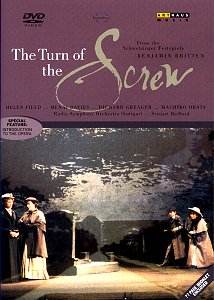The booklet informs us that this was a co-production
between the Schwetzinger Festival, the Royal Opera House, Covent
Garden and Cologne Opera. It was recorded in 1990, some years
before Steuart Bedford made his excellent recording for Collins
Classics (soon to be reissued on Naxos). Musically the production
is hard to fault, with Bedford's obvious skill and authority coming
over in every phrase of Britten’s ingenious score. The pit chamber
band respond enthusiastically and are well recorded.
Visually, the best aspect of the production is
John Gunter’s sepia-tinted monochrome set, which creates an effective
backdrop against which the Freudian ghost-thriller can unfold.
I say Freudian – in fact, the rather distressing sexual undertones
of the piece are played down here, and I doubt if the multi-layered
subtext is teased out as tellingly as Deborah Warner’s recent
Garden production. Still, I have no problem with a ‘straight’
rendition of the opera, and it does have the advantage of letting
us appreciate the marvellous variety and skill of Britten at the
height of his powers.
Apart from one serious piece of miscasting, all
the singers acquit themselves admirably. Helen Field’s Governess
displays youthful enthusiasm that quickly turns to anxiety, fear
and disillusionment. She has a relatively light soprano, one which
floats effortlessly in the more taxing bits (such as her ardently
lyrical letter scene) yet remains beautifully focused and firm-toned.
Old hand Phyllis Cannan (who sings Mrs. Grose on the Collins set)
makes an effective Miss Jessel, lurking mostly behind the backlit
gauze, but vocally powerful. Menai Davies’ Mrs. Grose displays
understanding for the Governess’s plight, constantly letting us
in on her understanding of the ‘situation’; she delivers the lines
"..he had his will, morning and night" with a chillingly
cold, spare tone. As Peter Quint, New Zealand-born Richard Greager
is in excellent voice, and though he too is required to be little
more than a sinister onlooker most of the time, his stage presence
needs to be commanding, as it is here.
Of the two children, I have no problem with Samuel
Linay, who acts his socks off in what is a gift role for a budding
opera star. He has obviously been well coached in the subtleties
of the part, and clearly enjoys his big moments, such as his famous
climactic shout of "Peter Quint, you Devil!" as he expires
in the arms of the Governess. My big concern, at least visually,
is the casting of his sibling, Flora. She is supposed to be around
twelve or thirteen years old, but is here played by an obviously
mature adult, Machiko Obata. Whilst this is often done on disc
(as with the Bedford set, where Eileen Hulse easily gets away
with it) it is a serious distraction on stage. Or should I say
on film, because it may have been no problem at a distance in
the theatre, but with constant close-up is very jarring. She towers
above Miles, and no amount of loose Victorian clothing and make-up
can hide the fact that she is an adult, looking at least as old
as the Governess. Vocally she is also more powerful than Helen
Field, and makes very little attempt to lighten the voice into
something more suitable. She is obviously an excellent artist,
but how on earth she was given this part remains a mystery.
While we’re on the subject of close-ups, the
penchant for zooming in for opera filming needles me as much as
some other reviewers. It does this production no favours. Apart
from reminding us constantly of Flora’s miscasting, it shows us
the obvious miming of the two ghosts, whose voices have been doctored
in places to have ‘ghostly’ reverberation. It also gives an unfortunate
(and probably unintended) glimpse of Miles’s awful mock piano
playing (Act 2, scene 6), as he sways around theatrically at the
keyboard, his hands completely at odds with the virtuoso music
we’re hearing. Again, a nice try that I’m sure would have been
effective in the theatre.
These quibbles should not put you off investigating
this release. The sound and film quality is good, and in Bedford’s
very capable hands, the musical rewards are considerable. It all
comes on one disc, which is just as well, as the one touted ‘extra’
is simply a short, narrated introduction to the opera, worthwhile
but no more than the booklet gives. Definitely worth buying for
singing, playing and intelligent production values, as long as
the caveats are noted.
Tony Haywood
